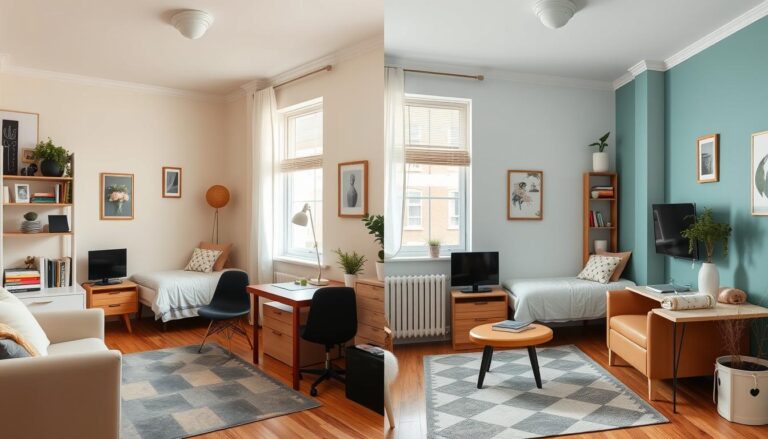How to design a vision board for your college goals
Get started with our guide on how to design a vision board for college goals. Visualize your path to academic achievement
College life brings endless opportunities, but staying focused on long-term objectives can feel overwhelming. A visual planning tool – often called a dream collage – helps transform abstract ambitions into clear, actionable targets. These creative displays combine inspiring images, meaningful quotes, and personal symbols to represent academic milestones and career aspirations.

Students juggling coursework, internships, and social commitments benefit from having a constant reminder of their priorities. Research shows that regularly viewing visual representations of objectives strengthens neural pathways linked to motivation. This practice keeps academic targets at the forefront of daily decision-making.
By organizing aspirations into one cohesive display, learners develop sharper focus on their educational journey. The process encourages reflection on personal values while mapping out practical steps toward degree completion. Many find that this method reduces stress by breaking large ambitions into manageable components.
Effective visual planners often include elements like graduation timelines, study abroad locations, or internship opportunities. These collages serve as dynamic tools that evolve with changing interests and achievements. Regular updates ensure alignment with current priorities throughout the college experience.
Key Takeaways
- Visual displays convert abstract goals into concrete daily reminders
- Regular engagement with aspirations boosts motivation and focus
- Combining images and text clarifies academic priorities
- Dynamic boards adapt to evolving educational journeys
- Visual planning bridges short-term actions with long-term outcomes
Understanding the Power of Vision Boards for College Success
Visual tools have become essential for students aiming to convert aspirations into achievements. These dynamic displays combine strategic elements to map educational journeys while maintaining flexibility for evolving priorities.
What Is a Vision Board?
A vision board organizes photographs, quotes, and symbols representing academic targets into one cohesive space. Recent studies in behavioral psychology show these collages activate neural pathways associated with determination. The Journal of Research in Personality notes individuals using visual planners report 34% stronger belief in their capabilities compared to traditional list-makers.
What Else Would You Like to Know?
Choose below:
Benefits of Visualization in Academic Achievement
Regular interaction with visual goals strengthens focus during demanding semesters. Three key advantages emerge:
- Enhanced clarity when balancing coursework and extracurricular activities
- Increased motivation through daily exposure to desired outcomes
- Improved adaptability as priorities shift between academic years
| Approach | Visual Elements | Emotional Impact | Adaptability |
|---|---|---|---|
| Traditional Planning | Written lists | Neutral | Rigid |
| Vision Boards | Images + text | High | Flexible |
This method bridges abstract ambitions with practical steps. Students often discover unexpected connections between academic targets and personal growth opportunities through the creative process.
Clarifying Your College Vision and Aspirations
Mapping your educational journey begins with honest self-reflection. Students often overlook the power of structured thinking when shaping their academic path. Dedicated time for introspection helps transform fleeting thoughts into concrete plans.

Identifying Key College Goals
Start by categorizing objectives into three time frames. Immediate semester targets might include maintaining a 3.5 GPA or joining a research group. Five-year aspirations could involve graduate school applications or industry certifications.
| Time Frame | Examples | Focus Areas |
|---|---|---|
| 0-12 Months | Course completion | Skill development |
| 1-3 Years | Internship placement | Career exploration |
| 3-5 Years | Professional licensing | Network expansion |
Brainstorming Ideas and Inspirations
Conduct a brain dump session using these prompts:
- What skills do employers seek in your field?
- Which campus organizations align with your values?
- How might study abroad shape your worldview?
This process reveals connections between academic requirements and personal growth opportunities. Students frequently discover hidden passions when exploring financial literacy targets or leadership development objectives.
how to design a vision board for college goals
Effective visual storytelling transforms educational aspirations into tangible milestones. Strategic selection of elements creates a personalized blueprint that evolves with your academic journey.
Selecting the Right Images and Words
Powerful collages combine symbolic visuals with intentional language. Graduation caps represent degree completion, while lab equipment might signify research ambitions. Neuroscience research reveals positive affirmations strengthen neural connections related to goal achievement.
| Image Category | Examples | Emotional Trigger |
|---|---|---|
| Academic Milestones | Diplomas, honor cords | Pride in achievement |
| Career Pathways | Office spaces, industry tools | Professional confidence |
| Personal Growth | Travel destinations, fitness icons | Life balance awareness |
Aligning Visuals with Academic Dreams
Connect imagery directly to specific educational targets. Marine biology majors might feature coral reef photographs, while business students could include stock market charts. A 2022 UCLA study found students using personally relevant symbols showed 28% higher goal recall during exams.
Natural elements like pressed leaves or sand grains add texture when representing environmental science objectives. Balance aspirational content with practical reminders – pair “Summa Cum Laude” phrases with study schedule templates.
Step-by-Step Guide to Creating Your Vision Board
Transforming academic ambitions into visual form requires strategic preparation and creative execution. This method turns scattered ideas into organized visual plans that guide daily choices and long-term priorities.
Gathering Materials and Inspirational Content
Start by collecting supplies that match your preferred format. Physical projects might need poster boards, adhesive tapes, and printed images from magazines or personal photos. Digital versions benefit from platforms like Canva or Pinterest for easy editing.
Focus on items representing academic milestones and career aspirations. Look for:
- Campus landmarks from target universities
- Infographics about GPA improvement strategies
- Quotes from industry leaders in your field
Arranging and Assembling Your Vision Board
Organize elements using the “golden triangle” principle – place key goals near the center. Group related items in clusters, like study abroad plans beside language learning reminders. Leave space for future updates as priorities evolve.
| Format | Best For | Tools Needed | Flexibility |
|---|---|---|---|
| Physical | Tactile learners | Scissors, glue, magazines | Medium |
| Digital | Tech-savvy students | Design apps, cloud storage | High |
Choosing Between Physical and Digital Formats
Consider lifestyle factors when selecting your format. Dorm residents might prefer portable digital boards accessible on laptops. Art majors often choose tactile versions using mixed media. Both methods effectively reinforce objectives when reviewed daily.
Update your creation each semester. Add new internship certificates or course completion badges. This keeps academic targets relevant through changing educational phases.
Incorporating Affirmations and Motivational Quotes
Strategic language choices amplify the impact of academic planning tools. Words embedded in visual displays activate neural pathways linked to determination and resilience. A Stanford study found students using personalized affirmations improved exam performance by 17% compared to peers relying solely on visual cues.
Crafting Purpose-Driven Statements
Effective affirmations combine specificity with emotional resonance. Instead of “I want good grades,” try “I earn B+ or higher through consistent study sessions.” This approach aligns with cognitive behavioral principles that link precise language to actionable outcomes.
| Ineffective Phrase | Empowered Alternative | Psychological Benefit |
|---|---|---|
| “Don’t fail chemistry” | “I master key concepts weekly” | Reduces anxiety triggers |
| “Maybe join a club” | “I lead one campus group by spring” | Enhances commitment |
| “Avoid all-nighters” | “I complete papers 48 hours early” | Promotes proactive habits |
Quotes from industry leaders add external validation to personal mantras. Microsoft CEO Satya Nadella’s “Learn it all” mindset resonates with students balancing multiple responsibilities. Rotate sayings quarterly to maintain fresh perspectives during demanding semesters.
Balance aspirational messages with practical reminders. Pair “Future CEO in training” with “Network with 3 alumni monthly.” This technique bridges long-term ambitions with immediate actions while sustaining motivation through academic challenges.
Tools and Creative Tips for Effective Board Design
Successful visual planners require the right materials and mindset. A well-prepared workspace sparks creativity while ensuring easy access to essential supplies. Let’s explore methods to enhance both physical and digital creation processes.
Cultivating a Creative Environment
Designate a flat surface with good lighting for assembly. Natural light boosts mood and color accuracy when selecting images. Keep materials organized in labeled containers – washi tapes in one bin, stencils in another.
Play instrumental music to stimulate focus without lyrical distractions. Research shows ambient sounds improve creative output by 23% compared to silent environments. Maintain a portable supply kit for dorm-room sessions or library brainstorming.
Recommended Crafting Tools and Digital Resources
Physical projects benefit from acid-free adhesives that preserve magazine clippings. Foam squares add depth to key elements like degree timelines. Digital creators should explore platforms offering drag-and-drop templates and cloud storage.
| Physical Tools | Digital Alternatives | Key Benefit |
|---|---|---|
| Photo-safe glue sticks | Canva Pro templates | Prevents yellowing |
| Metallic gel pens | Adobe Spark fonts | Enhances visibility |
| Rotary paper trimmer | Pinterest mood boards | Ensures clean edges |
Budget-conscious students can repurpose materials. Use free campus magazine racks for imagery sources. Save digital designs as phone wallpapers for constant reminders of academic targets.
Staying Motivated and Updating Your Vision Board
Maintaining momentum in academic pursuits requires consistent visual reinforcement. Place your vision board in high-traffic areas like bedroom mirrors or study spaces for daily visibility. These strategic locations transform abstract ambitions into tangible reminders that influence daily choices.
Regular Reviews and Goal Adjustments
Schedule weekly check-ins to assess progress toward academic targets. Replace completed objectives with new aspirations to keep your board relevant. Studies show updating visual planners every 3-6 months increases goal achievement rates by 22%.
Create a “victory section” to celebrate milestones like exam successes or club leadership roles. This practice reinforces positive habits while making space for evolving priorities. Rotate inspirational quotes seasonally to maintain fresh perspectives during challenging semesters.
Digital formats allow quick swaps of internship opportunities or study abroad locations. Physical boards benefit from layered elements that can be rearranged as interests shift. Both methods ensure your educational roadmap stays aligned with current ambitions.
FAQ
Why use a vision board for academic goals?
What materials work best for physical boards?
How do digital vision boards compare to physical ones?
Can affirmations boost academic performance?
How often should I revisit my board?
What if my goals change mid-year?
Where can I find inspiring quotes or images?
How do I organize a brain dump effectively?
The Best Colors to Make Your Student Apartment Feel Bigger
» See exclusive tips for your home








